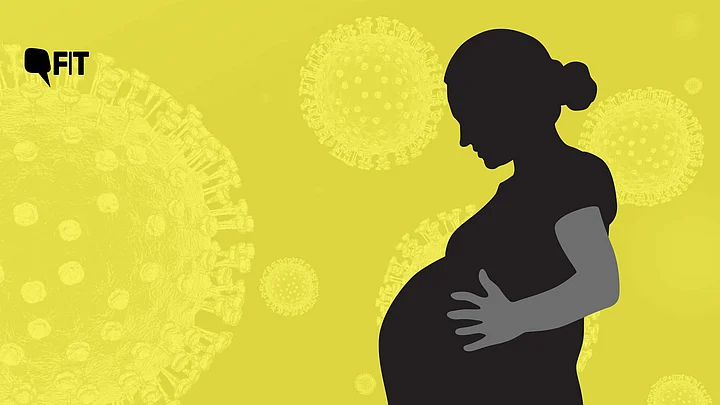It has been a week since Nandini Iyer slept peacefully. Now in her third trimester, the 28-year-old IT professional from Bengaluru has been 'on the edge' over the coronavirus pandemic.
Nandini says that she has been reading “non-stop” about COVID-19, the disease caused by the novel coronavirus. Echoing her is Namita, a journalist based in Delhi-NCR, who is also an expecting mother.
“I have been worried. Every corner you turn, people are discussing coronavirus. It is on TV, on social media and even on OTT platforms,” she says.
The question on each of their minds – are pregnant women at a higher risk of contracting coronavirus?
No, But Pregnant Women Can Have Low Immunity
Dr Ranjana Sharma, who has over 35 years experience as a gynaecologist, tells The Quint that while pregnant women must be cautious, they might not be at higher risk.
“For now, we know that elderly people are more at risk than others. Pregnant women are usually young and healthy. While they must take all the necessary precautions, they have no reason to worry.”Ranjana Sharma, Gynaecologist
The World Health Organisation, too, in their guidelines states that there is “no evidence that pregnant women present with different signs or symptoms or are at higher risk of severe illness”.
Dr Priya Jayachandran, who works in Rajiv Gandhi Government Hospital in Chennai, however, tells The Quint that while studies are yet to be conducted on this, expectant mothers are generally at a higher risk of contracting respiratory diseases.
“Pregnant women sometimes have low immunity and need more oxygen than women who are not pregnant. This makes them susceptible to respiratory infections like flu. While there is no need to panic, expecting mothers should take precautions.”
This is one of the reasons Namita, who is in her second trimester, is apprehensive.
“Pregnant women cannot take normal medication. We cannot just pop paracetamols. You’re always wondering how this will affect the baby.”
Can Pregnant Women Transmit Coronavirus to Foetus?
A new set of guidelines by the Indian Council of Medical Research on 13 April has said that it “may be possible” for pregnant mothers to pass on the virus to their newborn.
In their advisory titled The Guidance for Management of Pregnant Women in COVID-19 Pandemic, the ICMR also expanded on protective measures for hospital staff – including the use of PPEs for all healthcare workers present in the delivery room.
“With regard to vertical transmission (transmission from mother to baby antenatally [before birth] or intrapartum [during labour]), emerging evidence now suggests that vertical transmission is probable, although the proportion of pregnancies affected and the significance to the neonate (new born) has yet to be determined.”ICMR Report
On 4 April, the first baby to be born to a coronavirus-infected woman in Delhi was healthy.
The ICMR also added that there was no data to suggest “an increased risk of miscarriage or early pregnancy loss in relation to COVID-19.”
What Precautions Should Pregnant Women Be Taking?
While pregnant women, like others, should avoid public places, large gatherings and wash their hands with soap amid the coronavirus pandemic, gynaecologists tell The Quint that they should also:
- Take vitamin supplements regularly
- Avoid people who are sick, even if it's family members
- Exercise regularly, but inside their homes
- Avoid even small family gatherings
- Eat a balanced diet
- Work from home
- Absolutely avoid travelling out of the city
‘Don’t Consume Too Much Info on Coronavirus’
Dr Anisha Jain, who has been consulting in some leading hospitals in Delhi-NCR, tells The Quint that she has been receiving messages from her ‘anxious’ mothers to-be.
“It is completely okay for mothers to be anxious. Being pregnant is stressful enough and given that there is so much misinformation about the pandemic – it is only natural. That’s why I tell my patients to stay away from consuming too much information on the virus.”Dr Anisha Jain, Gynaecologist
Read and stay informed but get rid of the urge to know everything about it, she says, asserting that it will add to the stress.
Known Cases of Pregnant Women With COVID-19
But for Nandini, whose due date is in less than a month, not reading about COVID-19 does not seem like an option.
“I am really worried. What if I contract the virus? What will happen to the baby? How do I keep it safe – I cannot stop thinking about this.”
While a newborn baby in London has tested positive for the virus, it is still not clear if he contradicted it in his mother’s womb or after he was born.
However, a study published in the journal Frontiers in Pediatrics is the second out of China within the last month to confirm that mothers infected with coronavirus disease 2019 (COVID-19) during pregnancy did not infect their babies.
According to the researcher at Huazhong University of Science and Technology, none of the infants developed any serious symptoms associated with COVID-19 such as fever or cough, though all were initially isolated in neonatal intensive care units and fed formula.
Dr Sharma adds that the need of the hour for pregnant women is good antenatal care, counselling and discussion.
"Of course, they will be anxious. They would want to know if there is any harm for the baby. There are hardly any studies done yet. It is very important for the gynaecologists to share relevant information with them, talk to them and help them to cope overall," she said.
(With inputs from IANS)
(At The Quint, we question everything. Play an active role in shaping our journalism by becoming a member today.)
